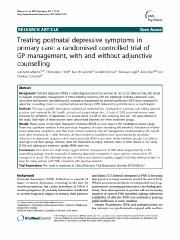Please use this identifier to cite or link to this item:
https://ahro.austin.org.au/austinjspui/handle/1/11274| Title: | Treating postnatal depressive symptoms in primary care: a randomised controlled trial of GP management, with and without adjunctive counselling. | Austin Authors: | Milgrom, Jeannette ;Holt, Christopher J;Gemmill, Alan W ;Ericksen, Jennifer ;Leigh, Bronwyn;Buist, Anne ;Schembri, Charlene | Affiliation: | Department of Psychology, Psychological Sciences, University of Melbourne, Victoria 3010, Australia Clinical and Health Psychology Parent-Infant Research Institute |
Issue Date: | 27-May-2011 | Publication information: | Bmc Psychiatry 2011; 11(): 95 | Abstract: | Postnatal depression (PND) is under-diagnosed and most women do not access effective help. We aimed to evaluate comparative management of (PND) following screening with the Edinburgh Postnatal Depression Scale, using three best-practice care pathways by comparing management by general practitioners (GPs) alone compared to adjunctive counselling, based on cognitive behavioural therapy (CBT), delivered by postnatal nurses or psychologists.This was a parallel, three-group randomised controlled trial conducted in a primary care setting (general practices and maternal & child health centres) and a psychology clinic. A total of 3,531 postnatal women were screened for symptoms of depression; 333 scored above cut-off on the screening tool and 169 were referred to the study. Sixty-eight of these women were randomised between the three treatment groups.Mean scores on the Beck Depression Inventory (BDI-II) at entry were in the moderate-to-severe range. There was significant variation in the post-study frequency of scores exceeding the threshold indicative of mild-to-severe depressive symptoms, such that more women receiving only GP management remained above the cut-off score after treatment (p = .028). However, all three treatment conditions were accompanied by significant reductions in depressive symptoms and mean post-study BDI-II scores were similar between groups. Compliance was high in all three groups. Women rated the treatments as highly effective. Rates of both referral to the study (51%), and subsequent treatment uptake (40%) were low.Data from this small study suggest that GP management of PND when augmented by a CBT-counselling package may be successful in reducing depressive symptoms in more patients compared to GP management alone. The relatively low rates of referral and treatment uptake, suggest that help-seeking remains an issue for many women with PND, consistent with previous research. | URI: | https://ahro.austin.org.au/austinjspui/handle/1/11274 | DOI: | 10.1186/1471-244X-11-95 | ORCID: | 0000-0002-4082-4595 | Journal: | BMC psychiatry | URL: | https://pubmed.ncbi.nlm.nih.gov/21615968 | Type: | Journal Article | Subjects: | Adult Cognitive Therapy.methods.statistics & numerical data Counseling.methods.statistics & numerical data Depression, Postpartum.therapy Female Humans Patient Compliance.statistics & numerical data Patient Satisfaction.statistics & numerical data Physicians, Primary Care Psychiatric Status Rating Scales.statistics & numerical data |
| Appears in Collections: | Journal articles |
Files in This Item:
| File | Description | Size | Format | |
|---|---|---|---|---|
| 21615968.pdf | 283.01 kB | Adobe PDF |  View/Open |
Page view(s)
88
checked on Mar 10, 2025
Download(s)
104
checked on Mar 10, 2025
Google ScholarTM
Check
Items in AHRO are protected by copyright, with all rights reserved, unless otherwise indicated.
